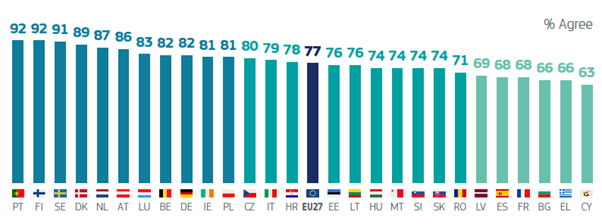
Culture Matters – Now More Than Ever
Culture isn’t just a backdrop to European life — it’s at its very core. According to the latest Eurobarometer survey, the vast majority of EU citizens believe that cultural exchange and creativity should be key elements of EU action. In fact, 87% agree that culture helps people identify with Europe and feel like part of a shared community.
Almost as many – 86% – believe cultural heritage is not just a thing of the past, but a vital part of our present and future.
This is more than just appreciation for museums or music festivals. It’s a powerful statement: Europeans see culture as a source of belonging, a bridge between generations and regions, and a driver of social and economic well-being.

Q5. To what extent to do agree or disagree with the following statements about freedom of artistic expression?
Artistic freedom is a fundamental pillar of any democracy. And European citizens understand that – 88% say it’s important to them. They believe artists should be free to express their thoughts and emotions without fear of censorship or repression.
But reality is more complex. Only 77% feel confident that artists in their country actually enjoy this freedom in practice. This gap reveals that in some Member States, restrictions or political pressures may still affect the cultural scene.
This should ring alarm bells for EU leaders. If we truly value democratic ideals, we must go beyond symbolic support for artistic freedom and make sure it is fully protected everywhere in the Union.
A fair, inclusive cultural policy must ensure that all artists – regardless of where they live – feel safe, supported, and free to create.

Q3. Please tell me if, in the last 12 months, you have either on your own or as part of an organised group or classes …? (MULTIPLE ANSWERS POSSIBLE)
A surprising and exciting trend emerged from the survey: 49% of Europeans have actively participated in artistic activities in the past year – a significant jump from 37% in 2013.
This means that culture is increasingly created by the people, for the people — not confined to opera houses or museums. From community murals to local music festivals and digital storytelling, young people and citizens across Europe are using art to express identity, emotions, and values.
This is a strong case for democratising access to the arts. Respondents are clear: art should be more accessible to all, not just a privileged few.

Q7. To what extent do you agree or disagree with the following statements regarding artificial intelligence (AI) and its role in art and culture?
The rise of generative AI is shaking up the world of art — and not without concern. 73% of Europeans worry that AI could harm jobs and income opportunities for human artists.
While AI opens doors for experimentation and innovation, it also raises ethical, creative, and economic challenges. Will human creativity be sidelined? Can originality still be protected in a world of algorithm-generated content?
Only 48% of respondents say they can tell the difference between art created by a human and one generated by AI. As the line between “real” and “robotic” blurs, the need for regulation and public education grows.
There’s also a deeper issue at play: only 51% of Europeans believe that artists in their country are paid fairly. If creative work isn’t properly valued, what message does that send to emerging talents?
What Citizens Expect from the EU
Europeans aren’t just pointing out problems — they’re asking for action. According to the survey, citizens want closer cooperation between their national governments and the EU in cultural policy.
Top priorities include:
- Making culture and the arts more accessible to everyone
- Protecting cultural heritage during conflicts, natural disasters, and climate crises
- Ensuring fair pay and decent working conditions for people in the cultural sector
The message is clear: Europeans view culture as a shared space — one that must be inclusive, protected, and nurtured.
A Compass for Europe's Cultural Future
These survey results are not just numbers — they are shaping real policy. They will feed into the EU’s upcoming cultural strategy, the Culture Compass for Europe, due to be published in 2025.
Until 13 May, the European Commission is collecting public input to help shape the final version. Young people and creatives are especially encouraged to speak up.
As EU Commissioner Glenn Micallef, responsible for intergenerational justice, youth, culture, and sport, stated:
“Culture is not only part of our identity. It’s the foundation for Europe’s future.”
Citizens have spoken: they want a Europe that supports artistic freedom, ensures fair pay for creators, and makes culture available to all.
The big question is — will policymakers listen? The future of European culture depends on decisions made today. Whether culture becomes a tool for unity and innovation — or is sidelined by other priorities — will be up to all of us.
Source of all graphics used in the article: Eurobarometer
Written by
Shape the conversation
Do you have anything to add to this story? Any ideas for interviews or angles we should explore? Let us know if you’d like to write a follow-up, a counterpoint, or share a similar story.
